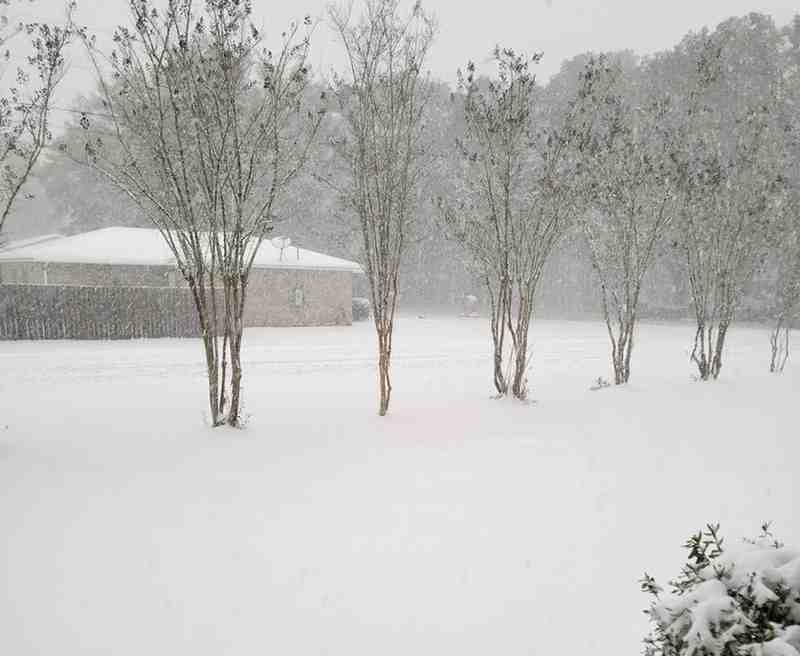Florida is bracing for its most significant winter weather event since 1989, with airports shutting down and officials urging residents in the western Panhandle to avoid travel. A severe snowstorm brought record-breaking snowfall to the Southern United States, resulting in at least 10 fatalities and widespread disruptions.
On Tuesday evening, reports indicated that Pensacola received between 5 to 12 inches of snow, prompting the Florida Highway Patrol to close a nearly 70-mile stretch of Interstate 10. By Wednesday evening, the closure expanded to 192 miles due to concerns that lingering snow and ice would refreeze overnight, creating hazardous travel conditions.
The National Weather Service (NWS) issued a rare Winter Storm Warning for counties stretching from Pensacola to Jacksonville, cautioning residents about the potential for snow and ice accumulation that could make travel perilous.
Florida Governor Ron DeSantis declared a state of emergency on Monday in anticipation of the severe weather, noting that the wintry conditions could set new records for the region. The previous record for snowfall in Florida was 4 inches, recorded in Milton on March 6, 1954, a mark that was surpassed on Tuesday with reports from Pensacola.
“I don’t have to tell anybody that we’re not necessarily used to walking in a winter wonderland here in Florida,” DeSantis remarked during a briefing at the state’s emergency operations center.
Utility companies along the I-10 corridor were on high alert for potential weather-related outages, which could occur if significant ice accumulation took place. The capital city, Tallahassee, resembled a ghost town as residents took the storm seriously, especially following an active hurricane season.
The heaviest snowfall was reported around Pensacola, where observers noted accumulations of 5 to 12 inches by Tuesday evening. Due to the treacherous conditions and multiple accidents, the Florida Highway Patrol closed a nearly 70-mile stretch of Interstate 10. Emergency officials had pre-treated some roadways, but those efforts proved inadequate in the face of the major winter storm.
According to the NWS, Pensacola officially recorded about 8.9 inches of snow, with similar totals reported in nearby Milton. Meteorologists in Tallahassee indicated that it would take several days to verify snowfall reports and determine if any city surpassed Pensacola’s measurements for the largest snowfall in Florida’s history.
In response to the hazardous weather, most school districts between Jacksonville and Pensacola canceled classes on Wednesday, including major universities such as Florida State University, Florida A&M University, the University of North Florida, and the University of Florida in Gainesville.
All flights at Tallahassee International Airport were canceled as of 3 p.m. Tuesday, with plans to resume operations by noon Wednesday. Similar cancellations were expected at Jacksonville International Airport, where the last flight was scheduled to depart around 8 p.m., with a return to normal operations anticipated by noon on Wednesday.
Frozen precipitation poses unique challenges for Florida, as many communities lack the necessary equipment, such as snowplows and treatment trucks, to keep roads and airports clear of dangerous conditions. The main gate at Naval Air Station Pensacola was closed to all traffic on Tuesday afternoon as wintry weather moved in from the west.
The Christmas week snowstorm of 1989 remains a benchmark for winter weather in North Florida and the Southeast. That historic storm, which developed on December 22, brought significant snowfall across the region, with Wilmington, North Carolina, reporting 15 inches and Jacksonville, Florida, receiving nearly 2 inches.
A band of 1 to 4 inches of snow generally extended along the Interstate 10 corridor from Tallahassee and Florida’s Big Bend to Jacksonville and points north.
The NWS noted that the recent winter weather event could lead to widespread power outages and severe crop damage, as arctic temperatures are expected to linger in the region for several days. As Florida grapples with this unprecedented winter storm, residents are reminded to stay safe and heed warnings from local officials.








